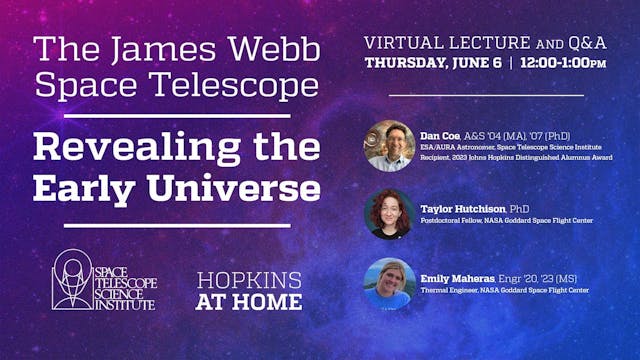Bioastronautics Symposium: Genomics in Space
Science, Engineering, & Technology
•
2h 0m
Presented by the JHU Human Spaceflight Lab, the Whiting School of Engineering Office of Research and Translation, and Hopkins at Home.
In the near future, government spaceflights will become more ambitious, with the NASA Artemis program sending people back to the moon (and later missions going on to Mars). At the same time, commercial spaceflight providers (SpaceX, Axiom, Blue Origin) are sending people into space who might not have the same levels of health and fitness as government astronauts. Both of these circumstances will challenge the ability of humans to tolerate spaceflight and perform inflight tasks in an extreme environment. Among the approaches to address this issue is genomic analysis: assessing a given person’s genetic predisposition to tolerate the stressors of spaceflight, measuring changes in genetic (epigenetic) makeup as a consequence of spaceflight, and developing countermeasures to the effects of spaceflight based on these individualized and personalized responses. The speakers in this symposium are experts in this field and are at the forefront of research into spaceflight effects on the genome.
#jhu #johnshopkins #hopkinsathome #hopkins #humanspaceflight #bioastronautics #genomics
0:00 - Introductions by Mark Shelhamer, Director of the Human Spaceflight Lab at Johns Hopkins Medicine
8:40 - Presentation by Michael Schmidt, CEO and Chief Scientific Officer at Sovaris Aerospace
48:42 - Presentation by Christopher Mason, Professor of Genomics, Physiology, Biophysics, and Neuroscience at Weill Cornell Medicine
1:17:48 - Questions from Christopher Bradburne, Section Supervisor for Sequencing and Computational Biology at the JHU Applied Physics Laboratory
1:43:23 - Audience Q&A
Up Next in Science, Engineering, & Technology
-
The James Webb Space Telescope: Revea...
With the Hubble Space Telescope, we have looked back in time and witnessed a rich diversity of galaxies growing, merging, and taking shape over 13 billion years of cosmic history. But the most distant galaxies in the early universe are too small and faint to study in detail with Hubble, leaving u...
-
Hopkins on the Hill: How Will Extreme...
Hopkins at Home on the Hill: How Will Extreme Materials Save The World?
Wednesday, May 19, 2021 @12:00PM EDT
For more information visit: https://www.jhu.edu/hopkinsathome/ -
Session 3: Music and Technology in th...
Thomas Dolby - the Homewood Professor of the Arts and head of the Peabody Conservatory’s Music for New Media program - answers the question: "Why use music in films?" in this detailed explanation of the history and conventions of musical scoring for films and TV, with a look into the future of in...



